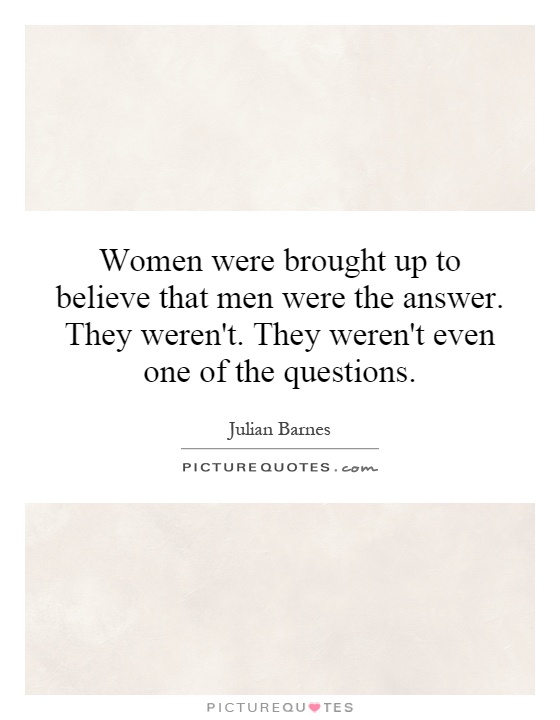Women were brought up to believe that men were the answer. They weren't. They weren't even one of the questions

Women were brought up to believe that men were the answer. They weren't. They weren't even one of the questions
In the world of Julian Barnes, the idea that women were brought up to believe that men were the answer is a common theme. Throughout his works, Barnes explores the complexities of relationships between men and women, often highlighting the ways in which women have been conditioned to seek validation and fulfillment through their relationships with men. However, Barnes also challenges this notion, suggesting that men are not the answer to women's problems, nor are they even one of the questions.One of the most striking examples of this theme can be found in Barnes' novel "Talking It Over." In this novel, the characters of Stuart, Oliver, and Gillian navigate the complexities of love and friendship, with each character grappling with their own desires and insecurities. Gillian, in particular, is portrayed as a woman who has been conditioned to believe that her worth is tied to her relationships with men. Throughout the novel, she struggles to find fulfillment and happiness, constantly seeking validation from the men in her life.
However, as the story unfolds, it becomes clear that men are not the answer to Gillian's problems. In fact, they only serve to complicate her life further, leading her down a path of confusion and heartache. Barnes uses Gillian's character to challenge the idea that women need men to be complete, suggesting instead that true fulfillment comes from within.
This theme is further explored in Barnes' novel "The Only Story," which tells the story of a young man who falls in love with an older woman. As their relationship unfolds, the protagonist grapples with questions of love, desire, and identity, ultimately coming to realize that the answers he seeks cannot be found in his relationship with this woman. Instead, he must look within himself to find true happiness and fulfillment.
Overall, Julian Barnes' exploration of the idea that women were brought up to believe that men were the answer is a powerful and thought-provoking one. Through his nuanced and complex characters, Barnes challenges traditional notions of gender roles and relationships, suggesting that true fulfillment can only be found by looking within oneself, rather than seeking validation from others.












 Friendship Quotes
Friendship Quotes Love Quotes
Love Quotes Life Quotes
Life Quotes Funny Quotes
Funny Quotes Motivational Quotes
Motivational Quotes Inspirational Quotes
Inspirational Quotes